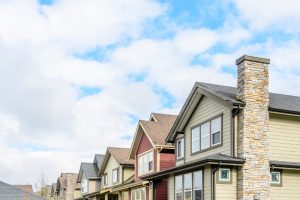Applying for a mortgage is an exciting step toward homeownership, but it’s important to approach…
10 Factors That Increase Property Value
Home prices often seem to rise, but not all properties appreciate equally. Various factors influence home price appreciation, affecting the value of homes whether you’re buying or selling. Let’s explore what drives property values up.
How Does Home Price Appreciation Work?
Home price appreciation refers to the increase in a home’s value over time. This is beneficial for homeowners looking to sell at a profit. Several elements affect home appreciation, including:
- The economy and real estate market
- Supply and demand in the area
- Local population growth
- Home’s age and condition
- Renovations or curb appeal enhancements
Key Factors Affecting Home Value
Here are some crucial factors that influence a home’s value:
- Location
- Neighborhood desirability: Certain neighborhoods are more desirable due to location, amenities, or local prestige. A prime location near good schools, parks, and amenities can significantly boost a home’s value. A desirable neighborhood with low crime rates, good schools, and ample amenities can command higher prices. For instance, a home located within walking distance of a well-rated school or a popular shopping district is likely to be valued higher.
- School system: Proximity to top-rated schools can significantly boost home values. Homes in districts with high-performing schools often see better appreciation rates. The quality of local schools can greatly influence home prices. Properties in highly-rated school districts tend to appreciate faster because families prioritize education.
- Access to highways and mass transit: Easy access to transportation can increase a property’s value. Convenient public transportation and proximity to major highways can attract buyers looking for easy commutes. Homes near public transit options, like subways or bus routes, are often valued higher because of the convenience they offer to commuters.
- Lot location: Homes on cul-de-sacs or corner lots often fetch higher prices. These locations often offer more privacy and less traffic, making them more desirable. For example, a house at the end of a quiet cul-de-sac is likely to be valued higher than one on a busy street.
- Size
- Number of rooms: More rooms can make a property more appealing, particularly for larger families. A home with more bedrooms and bathrooms is typically more valuable.
- Extra square footage: Larger homes tend to have higher values. Buyers often look for more livable space, and homes with finished basements or attics can add significant value.
- Lot size: Larger lots can offer more privacy and potential for expansion, increasing a home’s value. A larger lot can be more attractive, offering more space for outdoor activities, gardening, or future expansions.
- Number of bedrooms and bathrooms: Homes with more bedrooms and bathrooms tend to have higher values, especially in family-friendly neighborhoods.
- Housing Market
- Supply and demand: In a seller’s market, home values rise due to high demand and low supply. Conversely, in a buyer’s market, values might stagnate or decline due to higher supply and lower demand. Understanding local market conditions is essential. For example, if there are few homes available in a desirable area, prices are likely to rise.
- Local economic conditions: Employment rates, local industry health, and economic growth can affect home values. A strong local economy with growing job opportunities can drive up home prices.
- Age and Condition of the Home
- Newer homes: Typically require less maintenance and have modern features, making them more valuable. New homes usually have up-to-date systems and features, reducing the need for immediate repairs.
- Well-maintained older homes: These can also be highly valued if they have been updated with modern amenities and maintained properly. An older home with a new roof, updated electrical systems, and modern appliances can be just as valuable as a newer property.
- Historic value: Unique architectural styles or historic significance can increase a home’s value. Homes with unique architectural features or historical significance can command higher prices.
- Renovations
- Curb appeal: Improvements to the exterior, such as landscaping, painting, and new siding, can make a significant difference. Curb appeal creates a strong first impression and can increase the perceived value of a home.
- Kitchen and bathroom updates: These are often the most valuable renovations. Modern, updated kitchens and bathrooms can significantly increase a home’s value.
- Energy-efficient upgrades: Installing energy-efficient windows, insulation, or solar panels can attract buyers looking to save on utilities. Energy-efficient homes are increasingly in demand and can command higher prices.
- Future Development
- New infrastructure: Upcoming developments like new schools, parks, or public transit can increase nearby property values. Future development plans for a neighborhood, such as new schools, parks, or shopping centers, can enhance property values.
- Commercial development: New businesses moving into an area can boost the local economy and home values. For example, the opening of a large retail center or corporate headquarters can significantly boost local property values.
- The Economy
- National trends: Economic growth generally leads to higher home values, while recessions can cause prices to stagnate or fall. A strong economy typically leads to higher home values, while economic downturns can negatively impact prices.
- Local economic factors: Job growth and rising wages in a particular area can boost home values. Local job market strength and wage growth can drive demand for housing and increase property values.
- Real Estate Comparables (Comps)
- Recent sales: The prices of recently sold homes in the area set a benchmark for current home values. Real estate agents and appraisers look at recent sales of similar properties to determine a home’s value.
- Market trends: Increasing sale prices in the neighborhood indicate rising home values. Comps provide a snapshot of the current market and help set realistic price expectations.
- Interest Rates
- Lower rates: Generally increase buyers’ purchasing power, driving up home prices. When interest rates are low, buyers can afford more expensive homes, which can drive up prices.
- Higher rates: Can limit how much buyers can afford to spend, potentially lowering home prices. Conversely, higher interest rates can decrease affordability and put downward pressure on home prices.
- Zoning Regulations
- Residential vs. commercial: Zoning that allows for commercial development can increase property values. Changes in zoning laws that permit higher density or mixed-use development can increase property values.
- Future changes: Potential changes in zoning laws can also impact home values. Properties in areas where zoning laws might change to allow more development can see significant value increases.
Conclusion
Understanding what increases property value can help you make informed decisions whether you’re buying, selling, or investing in real estate. By focusing on key factors like location, size, market conditions, and renovations, you can better manage and potentially increase your property’s value.
If you’re interested in assessing your home’s value or planning to sell, consider consulting a real estate professional for a comprehensive evaluation.



